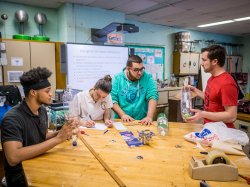https://thinkhighered.net/
Montclair State University is excited to establish its first credential-granting inclusive postsecondary education program in Fall 2024. The Higher Education Opportunity Act of 2008 (HEOA) allowed for the development of college programs such as the Certificate in General Education Studies (CGES) to support the needs of the under-served group of individuals considered to have intellectual or developmental disabilities who are college-bound.
Montclair joins over 300 US colleges and universities that offer programs for students with intellectual disability. The “Think Higher. Think College” video below was created to spread awareness about Inclusive Postsecondary Education programs and features students enrolled in various programs at institutions of higher education across the country. Programs such as Montclair’s CGES are designed to empower students to realize their higher education and life potential.
https://thinkhighered.net/
The Certificate in General Education Studies (CGES) provides an inclusive educational experience that features a wide array of academic, social, and recreational opportunities at Montclair State University. The CGES program curriculum is a representation of the academic undergraduate degree programs and includes a student-driven selection of courses in the liberal arts and sciences followed by study in a self-selected area of concentration. The program also includes a supported work experience related to students’ ambitions in career or continuing education. Instructional programming and support are provided to ensure the student’s success in credit-earning coursework.
- Exploring the Liberal Arts: Students will select courses from different areas of the liberal arts and sciences undergraduate core curriculum. Through this component, students will gain academic enrichment and explore areas of study.
- Student Success: Through orientation, continuous support, and college transition programming, students will have the opportunity to continuously develop and refine their personal goals. Person-centered planning is used to enable self-direction and self-advocacy for active engagement in student life and the use of campus support services. Students will plan and pursue college opportunities related to academic, social, service, employment-focused, and recreational experiences.
- Concentration: Students will choose a concentration area of study to explore different majors and career paths. The Discovery Program tracks are careers-focused and include: a) Social Justice, Public Service, and the Humanities; b) Business, Math, and Technology; c) Health, Medicine, and the Sciences; d) Arts, Culture, and Design.
- Career Preparation: Students will participate in an experiential learning course that takes place in an internship, externship, or other supervised work shadowing experience, which will provide hands-on practice with the skills learned. Students will also take a group seminar focused on career and workplace learning.
- Free Electives: In addition to the array of courses students will choose to fulfill the program requirements, they may also take free electives to follow their passions or seek out new interests to grow personally, develop academic skills, and become marketable in the workforce.
The Certificate in General Education Studies is recommended as a 2-Year Plan with total credit hours of 36-41 credits. Students will be required to register for more than six college credits each semester, and courses vary from 1-college credit to 4-college credits depending on the concentration.
| Year 1 Schedule | |
| Fall (semester total credits 7) | Spring (semester total 7-10) |
| New Student Seminar (1 credit) |
CGST 175: Continuing Student Seminar (3 credits) |
| CGST 150: College Orientation Seminar (3 credits) |
General Education Choice 3 or Free Elective (1 – 4 possible credits) |
| General Education Choice 1 (3 credits) |
World Language/Culture or General Education Choice 3 (3 credits) |
| Year 2 Schedule | |
| Fall (semester total credits 7-11) | Spring (semester total credits 10-16) |
| CGST 175: Continuing Student Seminar (3 credits) |
Concentration Course (1 – 4 credits) |
| Concentration Course (1 – 4 credits) |
Generation Education Choice 3 or Free Elective (1 – 4 possible credits) |
| Concentration Course (1 – 4 credits) |
CGST 275: Supervised Work Experience (6 credits) |
| *If more concentration credits are needed: Concentration Course (1 credit) |
*If more concentration credits are needed: Concentration Course (1 credit) |
| *If more concentration credits are needed: Concentration Course (1 credit) |
*If more concentration credits are needed: Concentration Course (1 credit) |
- CGES students have a desire to be a part of Montclair’s campus community and are motivated to further their education with college-level learning.
- CGES students are 18-25 years old at the start of the Fall semester and meet the definition of a “student with an intellectual disability” as defined in the Higher Education Act (HEA) law and regulations.*
- CGES students are unlikely to be admitted in a traditional degree program at a 2 or 4 year college or university based on the combination of their disability and their academic record.
- CGES is a commuter program, on-campus. Applicants need to have reliable transportation that conforms to their course schedule to and from campus for the duration of the program.
- CGES students can reliably communicate with others and should be able to follow the Montclair State University Code of Conduct.
*The Higher Education Opportunity Act, in Section § 668.231, defines a student with an intellectual disability. The term “student with an intellectual disability” means a student – (A) with a cognitive impairment, characterized by significant limitations in – (i) intellectual and cognitive functioning; and (ii) adaptive behavior as expressed in conceptual, social, and practical adaptive skills; and (B) who is currently, or was formerly, eligible for a free appropriate public education under the Individuals with Disabilities Education Act [20 U.S.C. 1400 et seq.].
- Phone:
- 973-655-3385
- Email:
- CGES@montclair.edu
